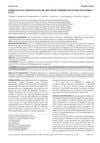 19 citations,
September 2004 in “Reviews in gynaecological practice”
19 citations,
September 2004 in “Reviews in gynaecological practice” Effective hirsutism management requires identifying the cause, combining new and traditional treatments, and setting realistic expectations for patients.
 81 citations,
March 2009 in “Seminars in Cutaneous Medicine and Surgery”
81 citations,
March 2009 in “Seminars in Cutaneous Medicine and Surgery” Effective hair loss treatment in women requires correct diagnosis and can include medications like minoxidil, antiandrogens, and treatments for underlying conditions like PCOS.
 8 citations,
March 1979 in “International Journal of Dermatology”
8 citations,
March 1979 in “International Journal of Dermatology” Dr. Vera H. Price's 1979 work emphasizes the importance of accurate diagnosis and personalized treatment for hair loss.
 9 citations,
January 1997 in “Gynecological Endocrinology”
9 citations,
January 1997 in “Gynecological Endocrinology” The document concludes that treating androgen excess needs patience, managing expectations is important, and many drugs used are not officially approved, suggesting cosmetic options for mild cases.

Modern hair restoration techniques can effectively treat hair loss and provide natural-looking results.
 January 2017 in “Elsevier eBooks”
January 2017 in “Elsevier eBooks” Sex hormones affect reproduction, sexual development, and oral health, and it's important for dental practitioners to understand their effects and interactions.
 1 citations,
October 2013 in “Journal of Postgraduate Medical Institute”
1 citations,
October 2013 in “Journal of Postgraduate Medical Institute” Metformin helps improve menstrual irregularities and some hormone levels in PCOS patients, but not symptoms like excess hair, acne, or hair loss.
 9 citations,
March 2001 in “Clinics in dermatology”
9 citations,
March 2001 in “Clinics in dermatology” Hirsutism in women is often due to hormone sensitivity and has significant psychological effects.
 30 citations,
January 2000 in “Dermatologic Clinics”
30 citations,
January 2000 in “Dermatologic Clinics” Finasteride and minoxidil are effective FDA-approved treatments for androgenetic alopecia.

The conclusion is that endocrinology significantly impacts medicine with various common medications used for treatment.

PCOS requires personalized treatment to improve life quality and reduce health risks.
 12 citations,
November 1993 in “International Journal of Dermatology”
12 citations,
November 1993 in “International Journal of Dermatology” The document explains that hirsutism, often caused by hormonal issues, can be managed with treatment to improve both physical appearance and mental health.
21 citations,
January 2020 in “Pharmaceutical Biology” Salvia plebeia extract can stimulate hair growth.
 17 citations,
January 1995 in “The American Journal of Medicine”
17 citations,
January 1995 in “The American Journal of Medicine” The document concludes that proper diagnosis and tailored long-term treatment can effectively manage androgenic disorders in women, improving patient care outcomes.
 7 citations,
August 2023 in “EClinicalMedicine”
7 citations,
August 2023 in “EClinicalMedicine” Anti-androgens can help manage some PCOS symptoms better than metformin but are not more effective than placebos or birth control pills for other symptoms.
 October 2021 in “Turkderm”
October 2021 in “Turkderm” Hormonal imbalances, not insulin resistance or dyslipidemia, may be more important in causing acne in women over 25.
 2 citations,
September 2014 in “Journal of evolution of medical and dental sciences”
2 citations,
September 2014 in “Journal of evolution of medical and dental sciences” Evaluating various physical and health factors helps diagnose polycystic ovarian syndrome (PCOS).
 1 citations,
November 2015 in “Journal of Evolution of Medical and Dental Sciences”
1 citations,
November 2015 in “Journal of Evolution of Medical and Dental Sciences” Certain skin symptoms can help detect and manage systemic lupus.
 17 citations,
February 2020 in “Journal of Pediatric and Adolescent Gynecology”
17 citations,
February 2020 in “Journal of Pediatric and Adolescent Gynecology” Early medical support for transgender youth is important for their health, with low regret for gender-affirming hormone use and a need for knowledgeable care providers.
 97 citations,
July 2006 in “Dermatologic therapy”
97 citations,
July 2006 in “Dermatologic therapy” The document concludes that accurate diagnosis and personalized treatment are important for skin problems in women with PCOS.
 December 2023 in “International Journal For Multidisciplinary Research”
December 2023 in “International Journal For Multidisciplinary Research” Indian medicinal plants can help with hair growth and common hair issues.
 May 2024 in “Portuguese journal of dermatology and venereology”
May 2024 in “Portuguese journal of dermatology and venereology” Reassurance and counseling are key in managing acute telogen effluvium, with supplements possibly offering a placebo effect.
 November 2018 in “Springer eBooks”
November 2018 in “Springer eBooks” Children need early diagnosis and treatment for iron-deficiency anemia to prevent learning problems and promote health.

Ayurvedic herbs may reduce side effects and improve effectiveness of cancer treatments.
 December 2023 in “Migration letters”
December 2023 in “Migration letters” Herbal treatments can help manage PCOS symptoms.
 68 citations,
January 2022 in “International Journal of Molecular Sciences”
68 citations,
January 2022 in “International Journal of Molecular Sciences” PCOS management includes lifestyle changes and medications, with ongoing research into repurposed drugs for better treatment options.
 December 2021 in “Journal of oncology research reviews & reports”
December 2021 in “Journal of oncology research reviews & reports” Polycystic Ovary Syndrome (PCOS) can lead to diabetes, heart disease, cancer, and mental health problems.
 104 citations,
November 1978 in “JAMA”
104 citations,
November 1978 in “JAMA” The Protein-Sparing Modified Fast is effective for rapid weight loss and maintaining it, but requires medical supervision and can have side effects.
 3 citations,
February 2018 in “Journal of evolution of medical and dental sciences”
3 citations,
February 2018 in “Journal of evolution of medical and dental sciences” Some ovarian tumors can cause masculinization, and it's important to check for various causes when this symptom is present.
 9 citations,
November 2013 in “Presse Medicale”
9 citations,
November 2013 in “Presse Medicale” The document concludes that managing female hyperandrogenism requires a combination of identifying the cause, lifestyle changes, medication, and cosmetic treatments.





























